The Battle for Obama’s Economic Soul
Instead of running with the "European socialist" crowd, as John McCain has claimed, Barack Obama has turned to the same American “free market” elite that views government as merely a corporate subsidiary. Even within that group, however, there are serious splits, and the more enlightened side seems to be winning.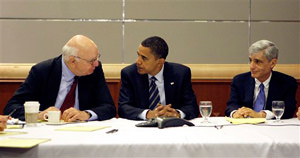
The battle for Barack Obama’s economic soul is on in earnest, and it has nothing to do with the “European socialism” that John McCain attempted to use as an epithet against him. The Republican quickly dropped that line of attack, perhaps because the European Union’s brand of democratic socialism has proved more effective in regulating the rapacious financial markets at the heart of the economic meltdown. Besides, the socialist British Labor Party has been President Bush’s most loyal supporter of the Iraq occupation that McCain has made the test of true patriotism.
It would be encouraging if the Democratic presidential candidate did indeed attempt to learn something from Europe’s democratic, and barely socialist, governing left concerning the welfare of those who are not super-rich, i.e., how to provide quality health care and education for all—but that is not what is happening. Instead, Obama has turned to the same American “free market” elite that views government as merely a corporate subsidiary. Even within that crowd, however, there are serious splits, and the more enlightened side seems to be winning.
Key among the good guys is former Federal Reserve Chairman Paul Volcker, who consistently challenged the radical anti-regulatory crusade of Alan Greenspan, his immediate successor at the Fed. Greenspan’s all-too-successful effort to give the banking lobby everything it had ever dreamed of was abetted by two Clinton-era secretaries of the treasury, Robert Rubin and Lawrence Summers. Unfortunately, the two, who should have mustered the grace to depart public life in deep contrition over their failed policies, are prominent in the Obama campaign.
Rubin, who pocketed tens of millions running Goldman Sachs before becoming treasury secretary, is the man who got President Clinton to back legislation by then-Sen. Phil Gramm, R-Texas, to unleash banking greed on an unprecedented scale. What followed, thanks to a rare display of bipartisan teamwork, was a total dismantling of the regulatory regime that President Franklin D. Roosevelt had put in place during the New Deal, thus undermining the finest legacy of the Democratic Party. Under the guidance of Rubin and Summers, Clinton signed off on the Gramm-Leach-Bliley Act and the Commodity Futures Modernization Act, Gramm’s two key pieces of legislation, during his final two years in the White House.
The first beneficiary of that legislation was Citigroup, which was allowed to merge with Travelers Insurance, where Rubin became a director after leaving the government. In his position on the executive committee of a floundering Citigroup, Rubin insisted as late as January of this year that a serious crisis was not forming. In a Jan. 31 article in Fortune headlined “Robert Rubin: What meltdown?” the subheading states: “In a talk on Wednesday [Jan. 30], the Citigroup director said the current financial upheaval is just cyclical. And none of the blame that there was to assign went to Wall Street.” The writer of the article, Katie Benner, quoted Rubin as saying that the problems were “all part of a cycle of periodic excess leading to periodic disruption,” neatly exonerating his own bank of any responsibility, even though Citigroup had already written down over $24 billion in bad mortgage losses.
At that time, Rubin was advising Hillary Rodham Clinton, while Obama, listening to Volcker, took the opposite tack, issuing a warning in a major address two months after Rubin’s talk that the United States was experiencing the most profound economic crisis since the Great Depression. Obama specifically cited the legislation that Rubin had supported and cautioned, “Our free market was never meant to be a free license to take whatever you can get, however you can get it.”
Although Rubin came over to the Obama campaign after Hillary Clinton’s defeat in the primaries, it does seem that Volcker and legendary investor Warren Buffett, another fierce critic of Clinton-era deregulation, are holding the floor for the time being. Buffett has been increasingly visible in the Obama campaign. More than five years ago, Buffett charged that the new investment devices, the “hybrid instruments” and “credit swaps” with which taxpayers are now stuck, were “financial weapons of mass destruction.”
Let’s hope that a President Obama will keep Buffett and Volcker close. They are certainly not the European socialists conjured up in yet another mean-spirited and irrational outburst of the McCain campaign, and their vision for the country seems to extend beyond their own bank accounts.
Robert Scheer is the editor in chief of Truthdig and author of a new book, “The Pornography of Power: How Defense Hawks Hijacked 9/11 and Weakened America.”
Your support is crucial...As we navigate an uncertain 2025, with a new administration questioning press freedoms, the risks are clear: our ability to report freely is under threat.
Your tax-deductible donation enables us to dig deeper, delivering fearless investigative reporting and analysis that exposes the reality beneath the headlines — without compromise.
Now is the time to take action. Stand with our courageous journalists. Donate today to protect a free press, uphold democracy and uncover the stories that need to be told.
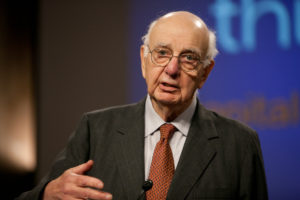

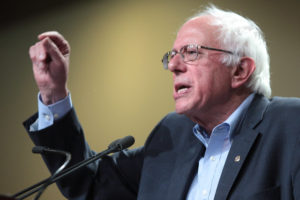
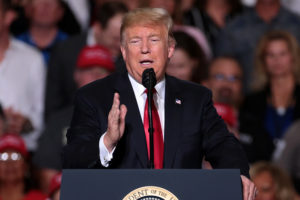
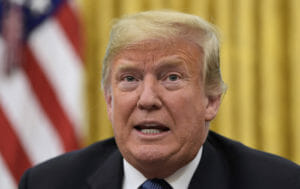

You need to be a supporter to comment.
There are currently no responses to this article.
Be the first to respond.